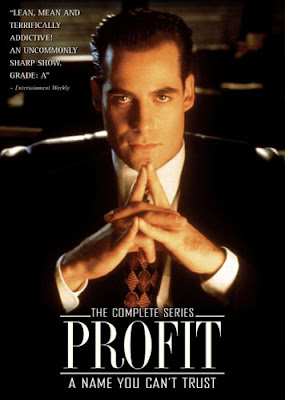and
and
Still, over the past several years we've seen returns to Clash of the Titans, The Karate Kid, Star Trek, Nightmare on Elm Street, Pink Panther, I Spit On Your Grave, Halloween, with more to come. In 2011, we can expect at least Footloose and Fright Night. There's also going to be a Big Momma's House 3, so keep your eyes open for that one.
Even more recently, television has gotten into the remake game.
2004's Battlestar: Galactica set the bar not just for television remakes, but science fiction shows in general (up until the crappy finale). In 2005, Russell T. Davies successfully regenerated the legendary, nearly 40-year-old series Doctor Who. Hawaii 5-0 returned this season on CBS as an immediate fan favorite. The CW has become dependent on the television remake with its versions of/sequels to Melrose Place, Beverly Hills 90210, and La Femme Nikita. Even previous mistakes got a second chance to fail, such as Rob Thomas' 2009 Cupid, which was received slightly less favorably than his 1998 version of the same series (7 aired episodes v. 14 aired episodes). And who can forget NBC's duel abortions of The Bionic Woman and Knight Rider?
A few weeks ago, Pushing Daisies' Bryan Fuller announced plans to remake The Munsters with more of a The Office/Modern Family spin. (Which I'm sure will be better than Tim Burton's The Addams Family. The man simply does not understand eroticism, and Gomez/Morticia might have been television's first highly sexualized couple. You'd want to watch them fuck.)
These reboots tend to follows a more “modern” (or postmodern) take on television. The shows are grittier, have a greater respect for continuity and ongoing storylines, are arguably smarter, and possess a much higher budget than their decades-ago counterparts.
However, for the most part, only dramas have been given the treatment. What about sitcoms?
I Dream of Jeannie
No longer the simple tale of a scantily clad servant desperate to please her astronaut master, Jeannie represents just one member of a much larger, quite extensive, universe of supernatural creatures. The complex mythology and history of Jeannie and the Jeannies will play a large role in the development of the series. The show's zaniness will be tempered with antagonistic spirits and considerable limits on Jeannie's powers. If the remake is still set in the 1960s, the space race and the communist fear plays a huge role in Major Nelson's life.
Additionally, Jeannie and Major Nelson's relationship, which will turn romantic fairly quickly, becomes one of epic destiny and TRUEST TRUE LOVE, forged in the annals of time.
(On the public front: people will swoon over Jelson, Major Nelson will be a teen heartthrob, and Nellows slash-fic will be crazy popular.)
Bewitched
Ignoring the incredibly misguided, but almost respectably crazy-in-concept, 2005 film, Bewitched is about a 1960s ad man who marries a hot blonde chick with issues. We know where this is going.
Bewitched 2010 does not need to change all that much from the original series, but the moral of the story will be vastly different. Even unlimited power and unlimited abilities cannot fully distract us or save us from the ennui and emptiness that is inherent in modern life. Sure Samantha can mess around with the laws of God and physics, but so what? Nothing ever changes.
At least not until season 3 when Samantha, fed up about everything, goes mad with power.
(On the public front: the internet will be outraged if Darren is recast. The very least the writers can do is make meta comments on it from time to time.)
Happy Days
Turns out the 1950s were not so happy. With our enlightened 21st century eyes, we know that series and movies from the 1950s and 1960s were balls of lies. Even looking back at the 1950s from a 20-year window further perpetuated those untruths. (Curse you Garry Marshall for having nostalgia.) Sixty years later, producers can finally force the Cunninghams to deal with cultures clashes, post-war blues, racism, sexism, oppression, homosexuality, depression, and the tragic death/disappearance of their oldest son.
Probably not Clancy Brown.
Go balls out by ending the first episode with a music montage showing Potsy shooting dope in Arnold's basement and Fonzie being stabbed to death by some actual street toughs. You will have viewers for episode 2.
(On the public front, 1950s fashion might come back in vogue. Some people will cry over the show being America-hating liberal revisionist history that ignores the greatness of America; others will cry that it doesn't go far enough.)
Green Acres
Once a fish out of water tale about a city boy fulfilling his dream of moving to the country only to discover its full of hicks and incompetents, Green Acres 2010 presents the plight of the American farmer and small town America amidst monopolization, corporate farms, and organic farming.
In today's world of globalization, even Hooterville is not free from the internet, Best Buys, and other modern conveniences. Can the citizens retain their identity in the face of corporate colonization? When Evil Corporate Guy tries to buy the land from the Haneys and the Ziffels, can Oliver Wendell Holmes step up and become Hooterville's grand protector? Is Mrs. Oliver Wendell Holmes becoming part of Hooterville society charming, or a dangerous example of going native?
(On the public front, expect very special messages about the environment to be inserted into nearly every episode while the cast makes pleas to help some Green cause.)
Three's Company
It's doubtful that anyone can duplicate the sheer charm that enabled John Ritter to make a show based solely on misunderstandings last nearly a decade. Equally impressive is that the series went 172 episodes without “officially” hooking up Jack or Larry with any of the chicks. Today, networks would probably be very insistent on at least one love story happening.
Cool, sleazy ladies' man Larry Dallas might overstay his welcome. The Roepers will continue with lack-of-sex jokes, but will be good for at least two Viagra references an episode. Mr. Roeper will be accused of cyberbullying Jack due to comments on Jack's alleged homosexuality. Second landlord/social retard Mr. Furley will receive a tragic back story and become a man to be pitied, rather than laughed at- an offshoot of his bizarre dead cat speech from 1984's “Look What I Found.” And maybe we'll figure out what the fuck was up with Lana.
(On the public front, a modern Three's Company would quickly fall victim to the Shipper Wars. The internet will be taken over by Team Janet fighting Team Chrissy, but Team Terry all the way.)
The Andy Griffith Show
Oh how we hate those old television shows that present the past with any sort of fondness. If you're not ironically condemning them, what's the point? Sure everything was whitewashed, but that was the style at the time. Besides, it's not like many modern comedies present life in 2010 as shitty as it actually is.
Much like Twin Peaks' Harry S. Truman, small town sheriff Andy Taylor will be forced to look into the dark underbelly of Mayberry, North Carolina. A lot of horrible secrets lurk beneath the pleasant facade, and Andy must confront problems like Otis' alcoholism, his confusing attraction to Aunt Bea, Barney Fife's retardation, and the end of segregation. There will always be the old fishing hole, but the quiet introspective moments only serve to remind Andy about the death of a time gone by, and further morph into an embittered, hard-boiled police officer.
(On the public front, see Happy Days.)
Gilligan's Island
Thurston Howell III will be young, rich, and CW-pretty So will The Professor. And The Skipper. And probably Gilligan. Or they'll combine fat and stupid for Gilligan so that the least attractive qualities are concentrated in one unlikeable character.
Racist natives might be recast to be slightly less racist, and reimagined as an ongoing threat throughout the entire series.
(On the public front, people will be debating for the show's entire run what everything means, they they are stuck on the island, why The Professor can't fix the box (interesting fact, in an early episode, The Professor actually does invent a glue and they attempt to sail back but the glue doesn't hold), etc. At the end, it'll turn out that all theories meant nothing. The series finale will just be an attempt from the producers to make the audience cry to distract them from the fact that no questions were answered and nothing led to anything.)
Hogan's Heroes
(On the public front, outrage from special interest groups will cause this show to be canceled before its first airing.)
Dennis the Menace
Can a child still be a menace in 2010? With zero tolerance policies in schools, outdoor play vaguely a memory, and parents opting to medicate their children instead of actually parenting them, Dennis Mitchell must live in a world where his rambunctiousness is a sign of ADHD instead of a natural expression of boyish boyishness. Can one young boy fight against an oppressive system while dealing with constant allegations of elder abuse (Mr. Wilson) and sexual abuse (Margaret)?

Instead of being a fat little misfit, Dennis will have six pack abs and George Clooney charm. Maybe Jay North could play Mr. Wilson.
(On the public front, if the show obtains any popularity, news programs will call in “experts” to explain why Dennis is a bad role model, what The Mitchells can be doing better, and signs that your youngster is troubled.)
Coach
Although Coach is the most recent show on the list, it could benefit from the sequelization concept utilized by that shows like Doctor Who, 90210, and Melrose Place. With the massive rise in popularity of college football and fantasy football, Hayden Fox can return as a sports commentator where his no-holds-barred approach to life could run afoul of our more PC culture. Also, he can be accused of cyberbullying his daughter's closeted boyfriend Stuart.
(On the public front, FUN FACT: Jerry Van Dyke is still alive.)

























































